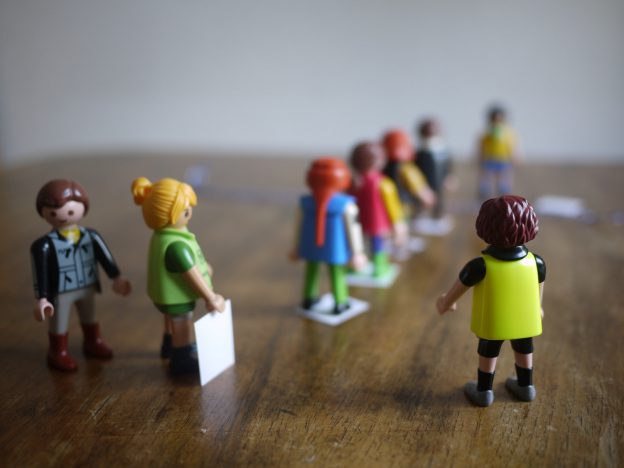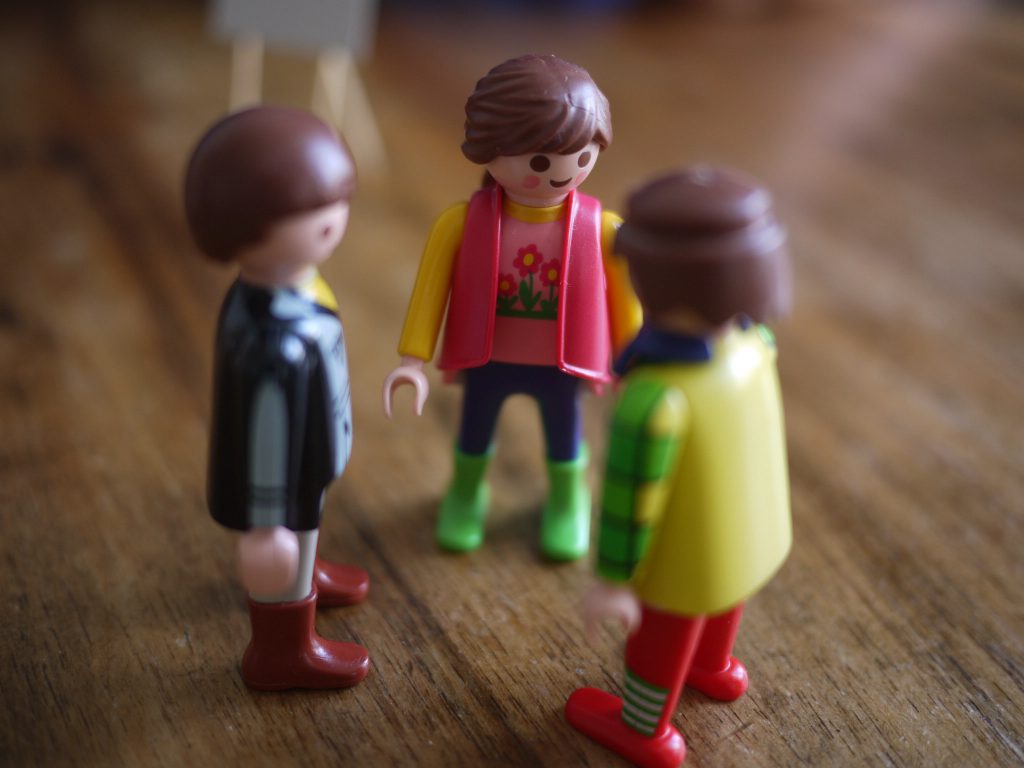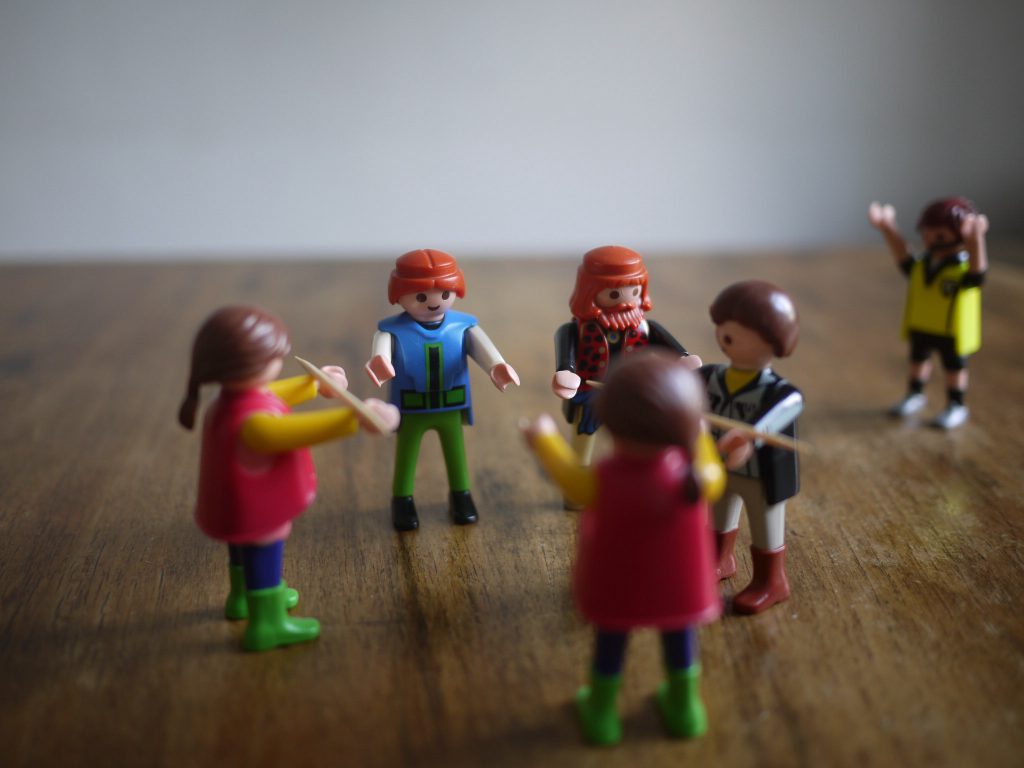
Many people know this: A „small“ change in a familiar procedure may hardly be noticed or it may throw everything out of line – or something in between, which is the more likely and more frequent effect. This is also the case with courses that have already been held several times, where the structure and content remain the same, but there is an occasional change in the trainers. Paul and Beate are facing exactly such a situation and would like to get advice from their colleagues this time.
Our five experts meet in the Prater this time. They want to do their exchange during a walk and as a method they have chosen a slightly modified form of the idea carousel. In groups of two or three they discuss Paul’s and Beate’s concerns several times for about 15 minutes each from different perspectives. In between, there are short meetings where they all stand together in a circle and bring their results together. Paul and Beate briefly explain again what they are concerned about: Paul has been training in a course for many years, always together with the same training partner. However, she has now changed her career. So Paul asked Beate if she would like to lead the seminar with him.
Now the two of them want to take a look at what it takes for Beate’s „integration“ into this assignment to be successful. Paul describes his concern as follows: „Of course, we will not completely change the seminar, which works well in terms of content. However, Beate also needs space to implement her ideas and conceptions.„
First round: problem outline
Paul and Beate describe the situation from their perspectives: Paul is with Yasemine, Beate with Maria and Rudi. After a quarter of an hour, the first „plenary“ is held in which the two points of view are exchanged:
Both Paul and Beate are very much looking forward to working together and are basically confident that everything will work out well. Paul fears that he might overrun Beate and not give her space because he already knows the design and the course well. At the same time, he doesn’t want to completely reinvent the seminar because the previous concept has worked well. He knows that he tends to „protect“ colleagues who are very young in the training context from the group. He would not have this fear with Beate because he sees her as an „old hand“ and knows that she has a lot of experience in this field.
Beate listens to Paul’s explanations calmly, then she tells her point of view: She is concerned about the question of „her“ place in the seminar. She is not worried about the content, but she is aware that she does not know the group culture as well as Paul and that this might cause her to clash. She fears that new inputs from her might not be taken up by Paul with arguments like: „I’ve already tried that, it doesn’t work“ or „that doesn’t suit the group“, i.e. along the lines of „we’ve never done it like that before„.
Yasemine took over the moderation of the individual parts: „Very cool how well you already know yourselves and your idiosyncrasies. That’s a really high level of self-reflection! Before we discuss it further, let’s go to step two, which probably sounds quite strange: We’re going to talk about what both sides could do to make the situation even more difficult for you two. We’ll meet again in fifteen minutes, over there, by the big tree.“
Step two: What could we do to make the situation worse?
The five of them march off again, in the same constellation as before. This part is very amusing and punctuated by a lot of laughter. You hear snippets of conversation like „Beate could always roll her eyes when Paul says something“ or „Paul could sit with his arms folded and just watch like a driving examiner.“ When the five arrive at the tree, a more relaxed mood is noticeable. Beate and Paul have released a lot of energy and fears in the exercise, which are either based on past experiences or are simply manifested fears that the two carry around. Yasemine introduces the next step: „Now it’s about the solutions: What could the two of them do to make the situation easier for themselves and each other? Just collect them, we’ll filter them later! We’ll just walk back down the main avenue and I’ll let you know when 15 minutes are up.“
Step three: Collect suggestions for solutions
Paul and Yasemine go first, Beate, Maria and Rudi follow at a little distance. It’s not so easy for Beate and Paul to just collect suggestions without immediately checking them for feasibility, but the others keep a close eye on them and bring them back each time. Yasemine and Rudi have taken on the task of writing down key words in their mobile phones. When the five meet for the last plenary, they exchange the keywords:
- Expose own limits and fears: What do I personally need to work well, what is sure to drive me up the wall?
- Agree on a code word for a short time-out/intermediate meeting.
- Go through the design, make a clear division of labour and everyone is allowed to change „his/her“ part.
- In the breaks, do short staff checks to clarify whether everything still fits.
- Talk, talk, talk!
- Tabula rasa: Discard the old design and plan completely new.
- Discuss joint working methods: Are ad hoc additions OK? Is this unwanted?
- Reconsider the goal of the seminar: What is really important?
- Gender-age balance: Avoid traditional division of roles: The „old man“ does the tough content, the „young woman“ is responsible for social issues.
Paul and Beate have to laugh out loud at the last point: „We’ve already discussed that,“ says Paul, „we definitely don’t want to leave that impression. We’ve already agreed that Beate will do the technical input and I’ll do the group dynamics to counteract the stereotype.
Step four: Sorting out and trying out
Yasemine and Rudi send the collected points to the joint signal group so that they are also available for the others. Yasemine asks Beate and Paul if they need anything else from the group. She summarises: „The next step now would be for you to think together about what of the suggestions is feasible for you and what you want to try out.
Basically, it is always a chance for structures that have existed for a long time to get a breath of fresh air. Paul is perhaps already blind to many things and Beate can question grown structures much more easily with a fresh look.“ Paul nods thoughtfully: „You’re absolutely right, of course. I’m sure I just don’t question some things any more because they are already so „normal“ for me. Anyway, I’m really looking forward to working with you.“ Beate nods vigorously. „Oh yes, now I’m really looking forward to when our seminar starts.“
Maria adds: „I think it’s also good for the group to see that new people can also be well integrated into leadership functions. That happens again and again in everyday work. If they then see that it can be honestly addressed and that it is also possible to question old structures, then that always holds a chance for change. I wouldn’t put too much emphasis on the group not noticing that the staff’s horizon of experience is different. I think it’s much better to be open about it.“ The others nod thoughtfully. They haven’t thought about it at that level yet.
At the next meeting, the five want to look at what their experiences are when expectations are not communicated well or not at all to the participants or when the participants do not take part in the seminar entirely voluntarily.
Authors: Gerda Kolb and Irene Zavarsky
Translation: Astrid Donaubauer
Want more? You can find all the articles in the series HERE!

Dieses Werk ist lizenziert unter einer Creative Commons Namensnennung-NichtKommerziell-Weitergabe unter gleichen Bedingungen unter gleichen Bedingungen 3.0 Österreich Lizenz.
Volltext der Lizenz



